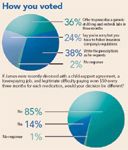Article
What would you do? Splitting pills
There's no one-size-fits-all answer, judging by your responses to our poll examining the difficulty faced by physicians caught between a frugal patient and an insurance company's rules.
James, a 45-year-old accountant new to your practice, comes in to request annual prescription refills for a mail-order pharmacy. You review his medical history: He has hypertension, high cholesterol, depression, and osteoarthritis. His father had a heart attack at age 48. James takes a generic diuretic, Lipitor (40 mg daily), Zoloft (50 mg daily), and OTC naproxen. From the records he brings with him, you note that he had tried generic lovastatin at 40 mg daily, which didn't bring his LDL cholesterol below his goal of 100 mg/dL.
After an uneventful exam, James tells you that his previous primary care physician always prescribed twice the actual dose of his Lipitor and Zoloft so he could cut the pills in half to save money. He shows you five-month-old containers for Lipitor (80 mg daily) and Zoloft (100 mg daily), and asks you to write the prescriptions just like his old doc did. He further notes, "I used to pay $25 for 90 tablets. This new health plan is charging me double that-$50 for each prescription."
You tell James that it's your policy to prescribe the actual dose a patient needs. He rises from his seat, visibly agitated. "The lousy pharmacy plan jacked up the copay, and now you're telling me you're going to make me pay four times as much as I used to?"
That's what we asked when we posed this and four other modern-day ethical dilemmas in our Aug 18 issue.

In justifying their choices, respondents cite a wide variety of issues, among them: patient autonomy, fraud, health concerns, medical record accuracy, and overpaid insurance company executives.
When patient benefit takes precedence
"A number of physicians apparently think that in this case, gaming the system-that is, prescribing double the dose that the patient is to take so that the patient can fill the prescription less frequently and thereby save money-is a small deception and not one that's morally reprehensible. Some might even view it as morally praiseworthy," says internist G. Caleb Alexander, a bioethicist who teaches at the University of Chicago's MacLean Center for Clinical Medical Ethics.
Indeed, many of our respondents agree. Kindra S. Browning, an internist in Dover, OH, comments, "I think pill splitting is great. Most pharmacy benefit managers don't pass on their cost savings to employers anyway. Also, I'm pretty sure the insurance company doesn't find any ethical issues in decreasing my payments."
Similarly, Kumud Jindal, an internist in Yonkers, NY, notes that "physicians and patients need to work together to improve patient health, which finances clearly affect." In what he acknowledges to be wishful thinking, Jindal adds, "With the extra cash, perhaps James can join a health club."





